

2023-24 at a Glance
£3,093,037.98
Total
£3,695,053 Charity
Company Number: 08837451
Registered Charity Number: 1156300
The
Road Safety Trust
(A company limited by guarantee)
Report and Financial Statements for the year ended 31 March 2024
The Road Safety Trust (RST) is a grant-funding charity committed to making UK roads safer, achieving impact through the funding of practical measures, research, dissemination and education. We have funded over 100 projects and awarded £9.9 million in grants since the Charity was established in 2014, becoming the largest independent grant funder of road safety initiatives in the UK. Our trading subsidiary company, UKROEd Limited (“UKROEd”), enables us to meet our charitable objectives through its education of road offenders and by distributing its surplus to the Charity to give out in grants. We share the same vision and this report shows what we’ve been doing this year to help make our vision a reality.
Legal and Administrative Information Contents
Trustees
Anthony Blackman (appointed 9th May 2023)
Victoria Coker MSc (appointed 9th May 2023)
Tanya Fosdick
Tony Fuller, Chair
Shaun Helman (resigned 14th November 2023)
Dr Neil Hoose FIHT
Marc Jones (appointed 6 August 2024)
James Kean (resigned 31st December 2023)
Emma Kelly MBA BA (Hons) (appointed 28th May 2024)
Dr Nick Reed MA DPhil
CSci MCIHT (appointed 15th May 2024)
Deirdre O’Reilly
Matthew Scott (resigned 10th August 2023)
Jo Shiner
Marlena Stefańska
Lisa Townsend (resigned 12 July 2024)
Heather Ward
Kathy Webster Vice Chair
Peter Williams MA Hons Cantab FCA, CMIIA (appointed 15th May 2024)
Company secretary Hugh Sutherland
Chief Executive
Sonya Hurt (resigned 8th November 2023)
Ruth Purdie OBE (appointed 14th November 2023)
Company Number 08837451
Registered Charity Number 1156300
Registered Office Colwyn Chambers York Street
Manchester M2 3BA
Website
www.roadsafetytrust.org.uk
Statutory Auditor
Crowe U.K. LLP
55 Ludgate Hill
London EC4M 7JW
Bankers
NatWest, City of London Office PO Box 12258
1 Princes Street
London EC2R 8BP
Legal Advisors
Pannone Corporate LLP
378-380 Deansgate Manchester M3 4LY
From the Chair and Chief Executive
Welcome to our consolidated Annual Report and Accounts for the year ended 31st March 2024.
This year has been a particularly busy year for the Trust and through our successful grant programme we have continued to grow.
During the 2023-2024 year we ran two grant rounds, a Small Grants Programme round in the Spring of 2023 and a Large Grants - Open Application round in the Autumn of 2023. There were two routes for funding in the Autumn round – Small Grants of up to £50,000 and Large Grants of up to £500,000. After three years of themed rounds, the Autumn round was ‘open’ meaning applications could be on any road safety related topic. The £500,000 maximum amount for applications was an increase on the earlier limit of £300,000. This reflected our aim of scaling up our grant-giving this year and meeting demand for an open funding round.
The main aim of the Small Grants Programme is to improve road safety at a practical level. The maximum project length for the Small Grants Programme
is 24 months. The minimum amount that can be applied for is £10,000 and the maximum is £50,000. The Large Grants strand for applications greater than £50,000, funds research and development of innovative practical interventions. The maximum project length for a Large Grant is 36 months and the maximum amount available this year was £500,000. All applications must meet our funding criteria including plans for monitoring and evaluation.
Each application was carefully assessed, with due diligence carried out by the grants team and then reviewed by the Road Safety Initiatives Committee (RSIC) to ensure that the Trust achieves its purpose of maximum impact on UK road safety through the initiatives it funds.
With a small grants team of 4 FTE and a voluntary Board of Trustees, we have built upon our progress of last year and much has been achieved.
This year grant applicants were informed by a webinar explaining the grant process and further supported by the opportunity to undertake 1:1 meetings with the grants team, resulting in a high number of submissions from a more diverse range of applicants.
Across the two application rounds in the year of the Small Grants Programme, 47 eligible applications were submitted and eight were awarded funding totalling £385,550. The Large Grant - Open Application round received 30 applications and following assessment eight were successful with over £2,211,820 being awarded.
Three strategic priority grants were also awarded this year totalling £490,619. A further grant of £5,049 was also awarded to a previously funded project for evaluation, underlining our commitment to supporting projects through to practical implementation.
As a result of this year’s funding I am delighted to report that a total of 20 new road safety projects have been awarded funding to a value of £3.1m. In total The Road Safety Trust has awarded £9.9 million in grants since its inception in 2014.
Several Trust funded projects have gained recognition at national and international awards. A motorcycle safety project in Scotland, which received funding from The Road Safety Trust, has been awarded a prestigious road safety award by a panel of international experts. Project PRIMEs has been given a Prince Michael International Road Safety Award, which is presented to organisations in recognition of their outstanding contribution to improving road safety. Transport Scotland worked with The Road Safety Trust, BEAR Scotland and globally recognised expert Professor Alex Stedmon to create 22 trial sites across Scotland where new road markings were installed to improve the riding behaviour of motorcyclists taking left hand bends.

The DriveFit film and workshop, aimed at pre-driving-age young people, also won a Prince Michael International Road Safety Award. The intervention was designed by Dr Elizabeth Box, research director at the RAC Foundation. DriveFit was funded by national level partners including the DfT, The Road Safety Trust, Road Safety GB, the National Fire Chiefs Council, the RAC Foundation, Kent Fire and Rescue Service. Surrey Fire and Rescue Service and Devon and Somerset Fire and Rescue Service.
In November 2023, The Road Safety Trust was delighted to have been presented with the Road Safety GB Corporate Award, recognising its significant contribution to saving lives on the road. The award was presented to the Trust by Sam Merison, Chair of Road Safety GB, at the National Road Safety Conference.
It is vital for charities to be able to articulate the difference they make with their funding, and The Road Safety Trust
Note from the Chair
In March 2024, The Road Safety Trust opened the new Manchester offices. These premises are to be shared with our trading subsidiary UKROEd and will support the activities of both organisations going forward.
works diligently to achieve this. We have a system and framework in place, that ensures that we capture results and carry out meaningful monitoring. This is supported by a rigorous audit programme.
During this year, the Charity bade farewell to a number of Trustees: James Kean, Chair of the Audit and Risk Committee; Shaun Helman, a member of the RSIC; and Matthew Scott, who represented the Association of Police and Crime Commissioners. We are grateful for their commitment, skills and support and the time they have given us.
We welcomed Lisa Townsend, Police and Crime Commissioner for Surrey, as the new representative for the Association of Police and Crime Commissioners.

Tony Fuller, Chair
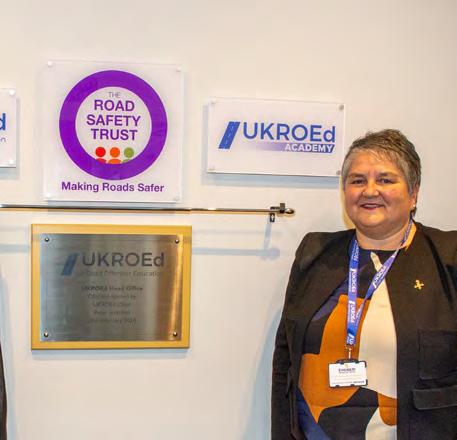
In November 2023, we were sorry to say goodbye to our Chief Executive, Sonya Hurt. Sonya was a Trustee and Vice Chair of The Road Safety Trust prior to taking up her Chief Executive post in July 2022. We are very grateful for Sonya’s contribution and leadership both as a Trustee and Chief Executive, as we continue to deliver on our Strategy and Grant Programme.
In November 2023, following a period acting in an interim capacity, we welcomed Ruth Purdie OBE (pictured) as the new Chief Executive. Ruth is the Joint Chief Executive of both UKROEd and The Road Safety Trust.
About UKROEd
With all of its activities, the Trust continues to work towards the vision that it shares with its trading subsidiary, UKROEd:
‘Zero
deaths and zero serious injuries on UK roads’
UKROEd provides the central assurance, standards and consistency of NDORS (the National Driver Offender Retraining Scheme). While the scheme has run for more than 20 years, UKROEd’s governance structures were only established in 2016 after The Road Safety Trust was created as its parent charity. Through its activities educating road offenders, UKROEd carries out primary purpose trading for the Charity and helps meet its charitable objectives. UKROEd is a not-for-profit company which distributes all its surpluses up to The Road Safety Trust for distribution through the Trust’s grants strategy.
The Police, Crime Sentencing and Courts Act 2022 makes specific provision for a policing body to charge a fee for approved courses offered as an alternative to prosecution for a fixed penalty road traffic offence. The Act sets out powers for the Secretary of State to make regulations exercisable by statutory instrument in relation to a number of matters pertaining to the operation, administration and funding of the provision of approved courses. This primary legislation places the Scheme on a firm statutory foundation, simplifying and clarifying the legal and financial basis of the Scheme. Secondary legislation in the form of statutory instruments will in due course be brought forward for parliamentary approval, further specifying detailed aspects of the provision of courses. The directors will liaise with police forces and other stakeholders to ensure compliance with the new legislation and to maximise the opportunity for improving road safety.

Public Benefit
During 2023-24, Trustees continued to review the Charity Commission’s guidance in relation to public benefit and were again able to give assurance that The Road Safety Trust had met the requirements of that guidance throughout the year.
In particular, Trustees concluded that the Trust demonstrates public benefit through its support of projects that address a range of road issues for different road users including hazard perception training for motorcyclists, post-collision triage, older driver training and advocacy to cite a few recent examples. Its grant-funded projects and development plans illustrate how The Road Safety Trust aims to benefit all UK road users and pass the test of whether the Trust makes a valuable difference to our society.
The Board confirms that it has complied with the duty in section 17(5) of the 2011 Charities Act to have due regard to guidance published by the Charity Commission (i.e., public benefit statement).
Thank you to our members, grantees and stakeholders
Our members are the UK-based police forces that participate in the National Driver Offender Retraining Scheme (NDORS). Their support of the Trust’s work is vital to enable the Charity to make the difference in its mission. Member police forces work in partnership with road safety organisations and local communities, encouraging grant applications and
spreading awareness about successful projects and initiatives. We are grateful to Chief Constable Jo Shiner for representing the membership on the Board of Trustees.
We have so far funded over 100 road safety projects being run by more than 60 different organisations - our grantees. This amounts to £9.9m of grants awarded since 2016.
We work in partnership with all our grantees who understand that their project objectives are our charitable objectives, and it is in the interest of our beneficiaries (the road using public) that we work with grantees to help achieve those aims.
Each project is a journey we embark on together. It commences prior to the grant acceptance stage where we offer support and advice to assist applicants. We thank our grantees for respecting the honest, transparent and collaborative approach that a genuine partnership requires. This approach consistently aligns with the values that the Trust is committed to:
INDEPENDENCE
The Road Safety Trust has been awarding grants for over 7 years and during that time has developed key stakeholder relationships with organisations such as Road Safety GB and Parliamentary Advisory Council for Transport Safety (PACTS), in addition to its members and grantees, for whose support we are grateful.
The Trust’s sole source of income for grants is its trading subsidiary company, UKROEd. So, it is important that we express our sincere thanks to the UKROEd team and Board of Directors for continuing to govern and develop NDORS efficiently and effectively across the UK.
Anyone who attends an NDORS course - physically or virtually - can be assured that the scheme is of a consistent standard and is being run cost effectively. All surplus funds are directed to the Charity’s purpose of making UK roads safer. The partnership between UKROEd and the Trust forms a virtuous circle of research, course development, governance, training, funding and research.

Vision, Purpose and Activities
The Vision, Purpose and Strategic Priorities of the Trust are outlined in the Strategy Map in the figure on the next page. A review of the Charity’s strategy was carried out in 2023, engaging with and recognising our key stakeholders, resulting in some new initiatives for implementation from April 2023.

Strategy Map 2021-2024
Zero deaths and serious injuries on UK roads
Vision
To make UK roads safer, achieving impact through the funding of practical measures, research, dissemination, and education
Purpose
Work with others to use the wealth of knowledge and understanding about what works to keep road safety high on the national and local agenda and influence policy change
Advocacy that influences
Share new knowledge from research and practical interventions across the road safety and wider community to raise awareness and encourage implementation
Dissemination that reaches
Work with grantees to investigate prevention, evidence existing approaches or development of new or different solutions
Invest in pilots and trials of innovative approaches and ensure practical application of new thinking is transferable to drive change
Research that informs Pilots that test
Review the national and international landscape to inform where efforts & resources should be targeted for greatest impact in UK road safety
Intelligence that defines
Each year the Trust runs a Small Grants round in the Spring and a Large Grants round in the Autumn. This year saw us scale up our grant making through increasing the size of eligible large grants to £500,000 and simultaneously running a second Small Grants round alongside our main Autumn funding round. The share of projects awarded compared to applications received was approximately
1 in 4 and strikes a balance between encouraging a variety of projects and applicants to apply while providing support to applicants to ensure their projects are eligible and meet the criteria for the grants programmes. To achieve this, we have continued to run webinars, workshops and 1:1 meetings, to support applicants through the grants process.
Progress made against the strategic priorities and objectives through 2023-24 is summarised below:
1
2 Strategic Priority: Intelligence that defines
Strategic Priority: Research that informs
a) Attract high quality research applications
MET: This year’s Large Grants round was an ‘open’ round rather than a themed round which meant projects on any road safety issue which met our funding criteria were eligible to apply. This formed part of our fiveyear strategic plan which was to hold an open round following 3-4 years of themed
rounds. We also raised the maximum amount that could be applied for from £300,000 to £500,000 for Large Grants. Eight exciting new Large Grants were funded in the year (as shown on pages 8-9) focusing on a range of road safety issues.
a)
Determine where grants are best targeted to make a difference to UK road safety
MET: Road safety is relevant to everyone, but there are known inequalities in health, sex and gender, age, society and economic circumstances which mean that use of the roads is not equally safe for everyone. In recognition of this, our 202425 Autumn Grants round will focus on the theme of Inequalities in Road Safety.
The aim of this grant programme is to bring to light areas of inequality and investigate ways they can be addressed to save lives and prevent injury on UK Roads. In this round, we are interested in how the interplay of various interconnected factors, including human, vehicle, and environmental elements may give rise to inequalities in road safety. We are also interested in how practitioners and policy
makers may be supported to address inequalities in road safety through following a safe system approach.
In order to define areas of focus and specific topics within the theme and to target our funding to where it can make the most difference a scoping report was commissioned from University College London.
b) A clear, agreed pathway for projects to progress from research to practical or policy intervention
MET: Of the 15 projects that closed in the year, 12 resulted in practical tools or interventions and 3 were policy focused projects where further work is ongoing.
To support projects on their journey to practical implementation we have launched a dedicated area of our website for grant holders. This includes a new ‘Knowledge Sharing Toolkit’ and a ‘Project Briefing Guidance’ as well as our Reporting Guidance, a useful guide to the grant process.

Sharing Toolkit: Guidance
3
Strategic Priority: Pilots that test
a) The Small Grants Programme is used to encourage piloting of potentially high impact initiatives
MET: This year there were two opportunities to apply for funding for Small Grants. As well as our usual Spring round, Small Grants could also be applied for during our Autumn round. In total across both rounds we funded eight Small Grants over the year. Six were trials or pilots and the remaining two were supporting the roll out of evidence-based interventions.
b) The Trust is considered a vital support and
awareness-raising
partner in the project’s journey to practical intervention
MET: Support has been provided in the form of funding for tools, resources and practitioners’ guides and through support for webinars and conferences.
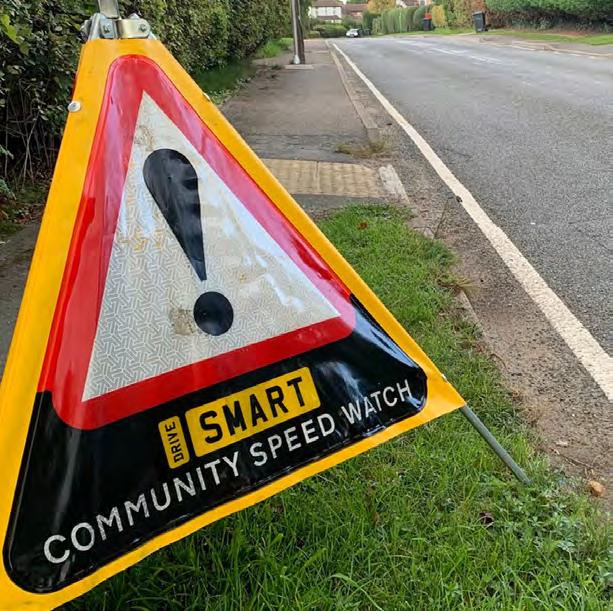
4
Strategic Priority: Dissemination that reaches
a) Collaborate with grantees to ensure dissemination that maximises the opportunity to reach target audiences and achieve impact
MET: Projects have dissemination plans which show how they will share learning and promote and make available outputs of projects, such as tools and resources. Projects have produced short promotional videos and attended conferences and other events. These include the Road Safety GB National Conference and UKROEd National
Conference. Two RST funded projects won the prestigious Prince Michael International Road Safety Awards, further providing an opportunity to highlight their excellent contribution to Road Safety: Transport Scotland PRIMEs Motorcycle Safety Project and Kent Fire and Rescue/RAC Foundation DriveFit Young Driver Training Intervention.
b) The road safety community is clear about the difference the Trust makes and its role in grant-funding, convening and its partnership potential
PARTIALLY MET: The Trust undertakes a number of initiatives to raise awareness of the difference made by its funding and to attract good quality applications. This includes producing guidance on grant rounds and running webinars and offering 1:1s for potential applicants. Our website was revamped to make information about projects and funding easier to access. Press releases, use of social media,
e-Bulletins, conference attendance and webinars all support the Trust to convey its purpose within the road safety community and other stakeholders. Work is also underway on a Symposium to take place in September 2024 to showcase the work of the Trust and help provide a steer on our future strategy. We have an ambition to raise the profile of The Trust and the projects we fund further.
c) The Trust’s impact and difference made through its funded projects is gathered and articulated on a regular basis
MET: The Trust gathers all information for projects annually and produces an ata-glance overview. We marked our first five years of grant-giving in 2021 with our Impact Report and will produce our second publication in 2025. The 2025 report will outline further how we have developed our
framework for measuring and monitoring the impact of a grant and the projects it funds. A Symposium planned for September 2024 will be an opportunity to focus on the impact which the different projects have made as well as providing a platform for projects to reach new audiences.
5
Strategic Priority: Advocacy that influences
a) Identify advocacy opportunities for completed and ongoing projects
MET: The Trust works in partnership with PACTS (Parliamentary Advisory Council for Transport Safety) to advocate on key road safety policy issues with a particular focus on those that are included in recommendations in RST funded projects. This year we renewed a two-year grant to PACTS to fund a dedicated Advocacy Officer post. The postholder has played a key role in a wide range of activities including policy briefings, conferences, convening events, responding to consultations and providing expert advice to government committees.
Along with other road safety organisations we support PACTS ‘Manifesto for Road Safety 2024’ and its four life-saving commitments of Developing a National Road Safety Strategy, Establishing a Road Safety Investigation Branch, Introducing Graduated Driver Licensing and Adopting Advanced Vehicle Safety Regulation. We have seen all these priorities consistently reflected in recommendations across the sector, including in projects we have funded. We believe that progress on these life-saving measure is now in sight.
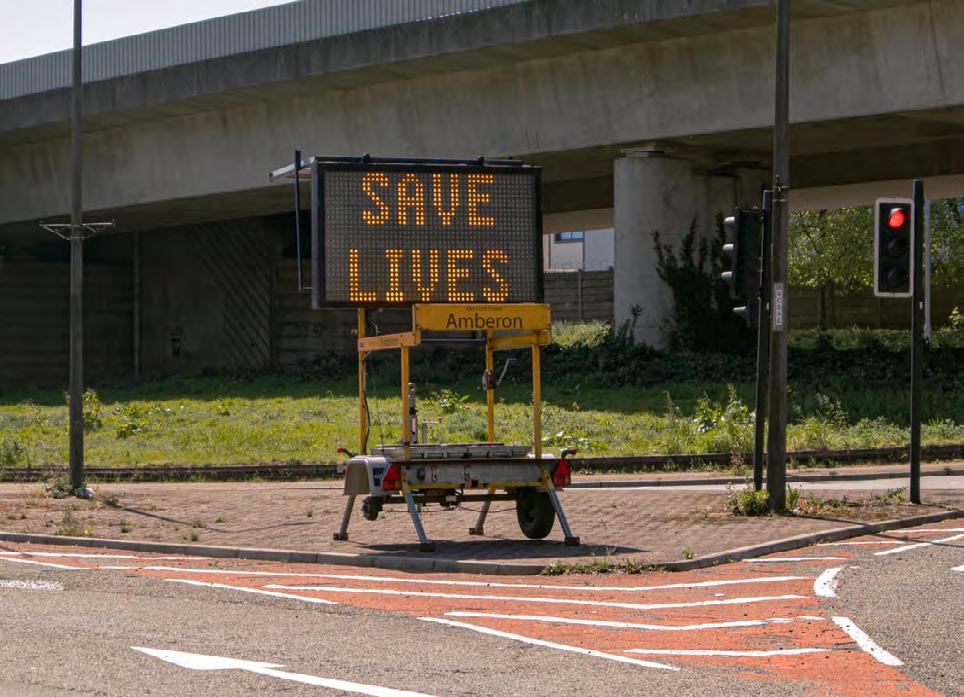

b) Work in partnership with others to achieve greater impact
MET: A key priority for The Road safety Trust is to work in partnership and to form collaborations that support our strategic aims and objectives.
Our advocacy agreement with PACTS is a key feature of our approach. This is supported by our partnership philosophy when working with different organisations and individuals who have been awarded grants.
This year we have continued to run webinars, workshops and 1:1 meetings, to support applicants through the grants process.
During this year we have further developed our partnership working with UKROEd, National Roads Policing Operations, Intelligence and Investigation (NRPOII), The National Fire Service Road Policy lead, National Highways, National Police Chiefs’ Council (NPCC) Road Policing Board, DFT, Road Safety GB, Brake, and the devolved governments of Wales, Northern Ireland and Scotland.
Work is underway on a pilot programme for roads policing projects which will be used to learn lessons about widening the reach of our funding and the type of support that can be provided to enable this.
The Trust has also joined the European Transport Safety Council (ETSC) to further disseminate its work and also to gain an understanding of road safety research, and projects across Europe. Through the appointment of our new Director of Communications we have ambitions to further develop our partnership footprint.
The 20 new grants awarded during 2023-24 are listed below.
Report of the Board of Trustees
In the year under review, the Trust continued to run its grant application rounds as well as considering and awarding follow-up funding.
The Trust invites applications for grants by announcing either a Large Grants themed round or a Small Grants programme round. Details of how to make an application are available on the Trust’s website, including formal policies, guidance, tips and videos. Applicants are asked to register on our website and respond to a questionnaire to ensure that their organisation is eligible according to our published criteria. The content of grant applications is specified in instructions to applicants, including objectives, beneficiaries, outcomes, methodology, evaluation, collaboration, innovation, schedule and budget. Applications are assessed by the staff on the grants team and the Trustees on the Road Safety Initiatives Committee.
Applications for Small Grants are approved by the RSIC and Large Grant applications which most closely align with our criteria are put forward for approval by the full Board of Trustees.
During the year 2023-24 we ran two grant rounds, a Small Grants round in the Spring and a Large Grants round in the Autumn. There were two routes for funding in the Autumn round – Small Grants of up to £50,000 and Large Grants of up to £500,000. After three years of themed rounds, the Autumn round was ‘open’ meaning applications could be on any road safety related topic. We also increased the maximum amount that could be applied for Large Grants from £300,000-£500,000. This reflected our aim of scaling up our grant-giving this year and meeting demand for the open funding round.
The Trust has now funded over 100 projects up to 31st March 2024, of which 73 have completed.
Every organisation that runs a project is our partner; we work together throughout the project’s lifetime to achieve mutual objectives. Full details of every project funded are featured on the Trust’s website.
LARGE GRANTS - OPEN APPLICATION 2023-24
IMPACT - the centre for postcollision research, innovation and translation
Amount Awarded: £492,058
Lead Organisation: Devon Air Ambulance Trust
In-Situ Mobile Application for the Triage of Pedestrians in Vehicle Collision (SENTINEL)
Amount Awarded: £409,319
Lead Organisation: Coventry University
1 2
Children Cycle Helmet Rating
Amount Awarded: £280,991
Lead Organisation: Imperial College London
3
Enhancing Novice Drivers’ Safety: Innovative Training to Improve Hazard Anticipation Skills
Amount Awarded: £268,617
Lead Organisation: University of Leeds
Maximising learning from child road fatalities: evidence for action
Amount Awarded: £249,635
Lead Organisation: University College London
4 5

A Virtual Rider Training Tool to Improve Children’s and Parents’ Cycling Awareness, Attentiveness, Attitudes and Safety
Amount Awarded: £213,325
Lead Organisation: The Bikeability Trust 6
The view from the saddle: What perspective works best for a motorcycle hazard perception test?
Amount Awarded: £51,594
Lead Organisation: National Young Rider Forum
Road Traffic Injury impacts of Clean Air Zones/Low Emission Zones
Amount Awarded: £193,825
Lead Organisation: Imperial College London
DriveFit 2.0
Amount Awarded: £50,000
Lead Organisation: RAC Foundation
Standardised Mature Driver Assessments to Improve Road Safety: An evaluation of implementation, delivery, and benefits across five English regions
Amount Awarded: £104,050
Lead Organisation: PACTS - The Parliamentary Advisory Council for Transport Safety

Enhancing Road Safety: Automatic Vehicle Triage in the NHS Ambulance Service for Improved Post-Crash Care and Injury Prediction
Amount Awarded: £49,553
Lead Organisation: Imperial College London
13
Driving Change Together
Amount Awarded: £49,371
Lead Organisation: Leeds Older People’s Forum
Safeguarding Vulnerable Road Users: Motorcycle Safety in Scotland using Applied Psychology to Influence Rider Behaviour: Phase 2
Amount Awarded: £313,300
Lead Organisation: Transport Scotland
Centre Line Removal Trialling for Safer Roads
Amount Awarded: £52,747
Lead Organisation: University of the West of England (UWE) - Bristol
Development of an on-road tractorbased VR assessment and training tool for agricultural drivers
Amount Awarded: £49,745
Extending the reach of RSGB Ageing Driver Training
Amount Awarded: £46,000
Lead Organisation: Road Safety GB
Advocacy
Amount Awarded: £127,600
Making Me Proficient at Walking and Cycling
Amount Awarded: £36,540
Lead Organisation: Foresight
Lead Organisation: PACTS - The Parliamentary Advisory Council for Transport Safety 17 18
Understanding and explaining the differences between the mentalmodels of motorcyclists and car drivers for detecting hazards: From theory to training
Amount Awarded: £49,719
Lead Organisation: Nottingham Trent University
Lead Organisation: Nottingham Trent University 7 14 15 16 8 10 9 19 20 11 12 SMALL GRANTS 2023-24
Look out for Laura - follow-up evaluation
Amount Awarded: £5,049
Lead Organisation: The British Horse Society (BHS)

Financial Review
Since its establishment, The Road Safety Trust has awarded £9.9m to over 100 projects and has incurred running costs of £2.5m.
It has set a prudent level of reserves and manages its investment in its trading subsidiary with a focus on governance and control over costs.
The Road Safety Trust relies on surpluses generated by its wholly owned trading subsidiary company, UKROEd, to carry out its grant-giving activity and meet its charitable objectives and does not undertake any fundraising activities with the public.
The Charity is conscious of keeping its operational overheads in proportion to grants awarded, as it is the allocation of grants that reaches the ultimate beneficiaries of the Trust via the projects it funds: the UK road user.
The cost of operating the Trust’s grantgiving activity came to £394,198 in 202324 (2022-23 £397,237). Most of this was salaries for the five staff of £226,736 (2022-23 £204,273), other operating costs of £103,260 (2022-23 £112,330) and governance costs of £64,202 (202223 £80,634).
In operating the NDORS scheme, UKROEd generated a surplus of £1,656,168 for the year 2023-24 (2022-23 £1,649,095). A loan facility of £500,000 (2023 £500,000) was approved by the Charity to its trading subsidiary in February 2024 to assist with working capital requirements.
Going concern
The Trust has not borrowed any money, has established a prudent level of reserves, is maintaining control over costs and continues to receive income from its trading subsidiary. On this basis the Board confirms that it is appropriate to continue to adopt the going concern method of accounting for the group.
Reserves Policy
The Reserves Policy demonstrates the compliance of The Road Safety Trust with its legal duties to act in the interests of the Charity and its beneficiaries, to protect and safeguard the assets of the Charity, to act with reasonable care and skill and to ensure that the Charity is accountable. The Policy is designed to:
• Justify and clearly explain the keeping or not keeping of reserves;
• Identify and plan for the maintenance of grants for beneficiaries;
• Reflect the risks of unplanned closure associated with the business model, spending commitments, potential liabilities and financial forecasts of the Trust and of its trading subsidiary, which operates NDORS; and,
• Help to address the risks of unplanned closure on projects we fund, staff and suppliers.
The Reserves Policy is monitored annually to review its effectiveness and application in light of changing road safety research needs and priorities, as well as changes affecting NDORS. The Trust keeps a level of reserves that is sufficient to:
• Meet a minimum of one year of operating expenditure in case of unplanned closure of the Trust;
• Mitigate the financial aspects of risk in the activities of NDORS; and,
• Commit to large road safety projects of long duration.
Reserves are unrestricted and are not formally designated for a specific purpose.
• One year of operating expenditure in case of unplanned closure of the Trust £0.4m;
• Mitigating the financial aspects of risk in the activities of NDORS £2.5m; and,
• Commit to large road safety projects of long duration £2m.
The targeted range of reserves in the policy reflects the fact that the contingencies identified refer to circumstances which may occur separately or at the same time. The Trust will therefore aim to hold reserves between £2.5m and £5m.
At 31st March 2024, the free reserves held by the Charity amounted to £3,695,053 (2023 £5,290,664). The consolidated reserves of the group are £3,695,053 (2023 £5,290,664).
Trustees consider that the level of reserves remains satisfactory and is compliant with the Reserves Policy.

Investment Policy and Performance
The secondary income source to the Trust was dividends and interest from investments which totalled £242,326 (2022-23 £93,706). The Trust confirmed an unsecured loan of £500,000 to its trading subsidiary on 7th February 2024 at an interest rate of 6% as an investment within its portfolio which was outstanding at the end of the year. £5,400,000 (2023 £4,942,610) was held in interest bearing deposit accounts with National Westminster Bank plc.
The Trust’s Investment Policy states that the long-term investment objective is to generate a total return in excess of inflation (as measured by CPI), while generating an income to support the ongoing activities of the Trust, the level of which will be determined by Trustees from time to time, subject to acceptable levels of risk. The Trust also can invest in its trading subsidiary in order to provide sufficient funds for its continued operation of the NDORS scheme.
Trustees place a high priority on maintaining the real value of capital funds and of income returns over the long term, subject to acceptable levels of risk. They accept that at times this will mean accepting short or mediumterm fluctuations in capital value. The key risk to the long-term reserves is inflation, and surplus assets should be invested to mitigate this risk over the long term.
A review of the Trust’s Investment Policy set out investment time horizons over which funds may be required. The policy sets out events which require a review of time horizons and allocation of funds. Funds held to meet shortterm (within one year) needs are held in bank current accounts and short-term deposits. Funds held to meet mediumterm (between one and five years) are held in bank deposit accounts with up to three years notice. Long-term funds, which are needed after more than five years, may be invested in financially regulated assets which may be subject to risk in their capital value.
Investment in the Trust’s trading subsidiary is in the form of a loan. The Trustees considered the risks associated with the loan facility of £500,000 confirmed in February 2024, determined the appropriateness of advancing loans under the facility and set the terms of repayment and interest accordingly. A loan of £500,000 was confirmed on 7th February 2024 and was outstanding at the year-end. The loan bears interest at 6% and the facility expires on 31 October 2025.
Short term cash reserves are held to provide financial security and may be required at short notice. As such, capital volatility is avoided by choosing instant access and shortterm bank deposits. The balance of funds in pooled investments, term bank deposits and instant access bank deposits are reviewed periodically. The overall return on invested assets (i.e. capital gains and dividends from investments, deposit accounts and
instant access accounts) was 3.9% (3.9% in 2022-23). Prevalent economic conditions presented a challenge to achieving the policy objectives in the year, as risk-free interest rates dipped below 4%, while inflation as measured by the CPI index reduced to 3.2% by March 2024. The Trustees continue to monitor the most prudent way to meet the policy objectives with regard to balancing risks and returns.

Structure, governance and management
The Road Safety Trust is a company limited by guarantee, not having a share capital (Company number 08837451) incorporated on 8 January 2014 and is a charity registered in England and Wales on 20 March 2014 (Charity Number 1156300). Its governing document is its Articles of Association, and its members are the Police Forces of the United Kingdom which participate in the NDORS Scheme.
Recruitment, training and appointment of new Trustees
The Directors of The Road Safety Trust are also the Trustees for the purposes of charity law.
There were three resignations and one appointment to the Trust Board during 2023-2024.
The new Trustee is Lisa Townsend who replaced Matthew Scott as the APCC representative on the Board. James Kean (Chair of the Audit and Risk Committee) and Shaun Helman were the resignations. Marlena Stefańska replaced James Kean as Chair of the Audit and Risk Committee.
Chief Constable Jo Shiner, who is the NPCC lead for the Roads Policing portfolio, continues to ensure that the Police Force membership is represented on the Trust Board. The Trust employ a skill led, approach to recruitment and this supports a key objective under Diversity, Equality and Inclusion. This is monitored as part of the Trust’s commitment to the Charity Governance Code.
On the 31st of March 2024, the Board’s minimum requirement of a number of Trustees with skills and experience was exceeded in all 22 out of 24 areas identified as necessary for an effective Board.
The Charity recognises the importance of a comprehensive induction for new Trustees and learning and development for existing Trustees. This enables Trustees to discharge their duties and fulfil their roles properly.
To support this approach the Trust have an Induction, Training and Development Procedure in place. This outlines how individual Trustees will be supported in their development during their term of office.
Part of this involves a number of subscriptions and memberships that benefit Trustees’ learning and development. Examples include National Council of Voluntary organisations (NVCO), Association of Charitable Foundations (ACF), Civil Society Governance and Leadership magazine and online access, The Association of Chairs and VICE chair, as well as a number of road safety specific subscriptions.
Opportunities for Trustee learning and development are circulated to the Board by the Chief Executive as they arise. This includes an insight into courses developed by UKROEd for the NDORS Scheme.
Board governance
The Board meets quarterly on a virtual basis three times per year and once as a face-to-face meeting at the May Board. The Chair and Trustees have managed to run and hold effective meetings virtually and the in-person meeting helps the Board to build cohesiveness and improve communication. Having fielded Trustee opinions and preferences through a survey, a blended approach seems to be the most popular going forward and the Trust will continue to hold face-to-face Board and virtual Board meetings.
Trustees are encouraged to be members of at least one Committee. The Audit & Risk (A&R) and Road Safety Initiatives (RSI) Committees meet three or four times per year. The Remuneration Committee meets annually unless otherwise required. In accordance with its Terms of Reference, the Remuneration Committee ensures that Trust staff are remunerated in line with the Remuneration Policy. The Nominations Committee meets at least twice a year or more often as necessary.
In addition to the above, an RST review of risk and risk appetite was held in person in February 2024. This session was facilitated by specialist consultants and enabled the Trustees to discuss risk and risk appetite with particular reference to both the governance role and grant programme.
Work has commenced on a planned symposium which is to be held on 10th of September 2024. This will both celebrate the work of the Trust over the past 10 years and also determine how we look forward for the next 5 years. Further, it will help inform our planned strategy review in November 2024.
There is also an established feedback system following the Charity’s and UKROEd Board meetings. The Trustee representative together with the Joint CEO play a crucial role in this flow of information and communications supported by the Head of Finance.
In the Charity, senior management members report to the committees that relate to their areas of responsibility (E.g. The CEO and Head of Finance report to the Audit and Risk Committee and Remuneration Committee. The Grants and Impact Director reports to the RSI Committee). RST team members also provide updates to the full Trustee Board agenda.
In this way Trustees are kept updated on the practical and pertinent issues affecting the Trust directly by staff other than the Chief Executive and can make decisions on an informed basis. Minutes from Board and Committees are issued in time and posted on the online Trustees’ Login Area for the quarterly Board meetings. Committee Chairs bring significant items to the Board for discussion and decisions accordingly. Each of the Committees have reviewed their terms of reference within the period, with changes brought to the full Board for approval.
Due to the changeover of Chief Executive and Trustees, the effectiveness review of each Committee will be undertaken in 2024 alongside a review of the RST Strategy which expires in 2024.
Individual attendance records 2023-24
The Directors and Officers insurance and third-party indemnity insurance for Trustees remains in place and was renewed on the 29th of July 2023. The nature and scale of the indemnity will continue to be under review. The cost of the insurance for the year was £3,095. (£10,930 in 2023)
The Charity continues to be supported by a small team through the period, consisting of 5 part time employees. The Trust have invested in further support for the grants team to support an increasing grants programme.
Ruth Purdie was appointed as Joint Chief Executive of both the Trust and UKROEd, replacing Sonya Hurt as Chief Executive of the Trust.
Current staff include Louise Palomino (Grants and Impact Director), Tanya Qadir Dodgson (Grants Programme Manager), Victoria Sinclair (Governance and Compliance Officer) Dr Lindsay Eckley (Grants Officer) and Angharad Williams (Grants Officer).
Hugh Sutherland is Head of Finance and also Finance Director for UKROEd, where most of his time is allocated.
Trustees are grateful to the staff team for their professional support and ongoing commitment throughout the year.
In addition, communications, website, PR and HR support is provided by contracts and support from UKROEd.
Board and Committee Attendance Records for the period 1st April 2023 to 31st March 2024
Tony Fuller Chair
Marlena Stefańska
Tanya Fosdick
Heather Ward, Chair RSIC
Neil Hoose
Deirdre O’Reilly
Kathy Webster, UKROEd rep, Chair RemCom
Jo Shiner Victoria Coker (appointed May 2023)
Diversity, equality and inclusion
The Charity recognises the importance and benefits of embracing diversity, equality and inclusion. It is important as the organisation is responsible for a significant grants programme, and governance of a subsidiary, along with our own internal governance.
It is also vital, that we ensure that our approach to policies, our people, governance documents, stakeholder management, systems and data and course development reflects our approach to making the grant programme “fair and transparent for everyone”.
Secondly, by considering how we can work both internally and externally with key stakeholders, and the public, to improve access and inclusivity we are ensuring the development of our people, processes, and culture.
Those who engage with the scheme and The Road Safety Trust represent over 2 million people. By ensuring that their experience is inclusive and respectful we are supporting their choices and requirements.
The lead Trustee for Diversity is the Chair of the Board.
The Charity’s Board have the following Diversity, Equality and Inclusion objectives:
1. To meet the skills and experience identified as necessary at Board and Committee level:
2. To actively encourage and seek out individuals from under-represented groups who are able to fill the skills and experience gaps as and when Trustee vacancies arise.
3. To strive for a balanced and diverse Board in its widest sense.
4. To reflect as far as possible the community of interest of the Charity’s ultimate beneficiaries – the public.
The following page outlines the Trust’s performance against these objectives as of the 31st of March 2024 (11 Trustees holding office in March 2024)
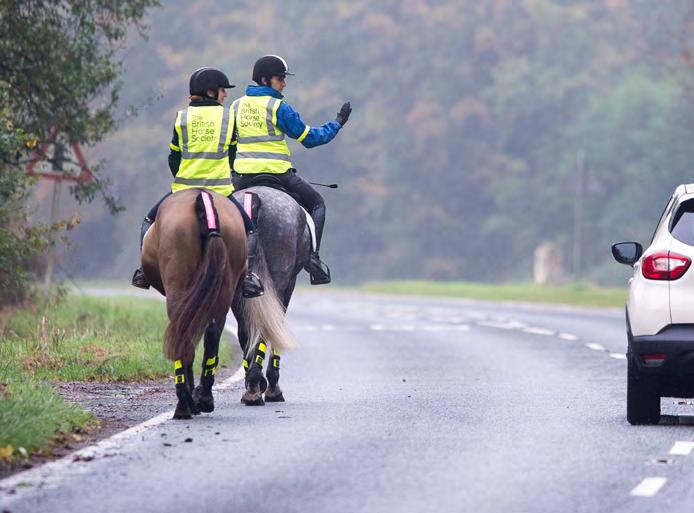
2023-24 Board
Gender
Ethnic Origin
Type of Road User
Stakeholder representation and engagement
Our police force members are represented on the Board of Trustees by Jo Shiner, Chief Constable of Sussex Police and NPCC Lead on Roads Policing. The Association of Police and Crime Commissioners (APCC) also have representation on the Trustee Board, thanks to Lisa Townsend PCC for Surrey from August 2023. During the year and prior to the 2023 AGM, we engaged with and held constitutional correspondence with police force members. The AGM, which was held virtually was attended by members and or their representatives.
During 2023, we re-established our key stakeholder bulletin the “Talk of the Trust”, this has enabled us to reach a wider range of stakeholders. By working in collaboration with UKROEd and NRPOII (National Roads Policing Operations, Intelligence and Investigations) we have contributed to bulletins and held RST webinars to further disseminate the work of the Trust and the grant programme.
A new contracted collaboration with Stennick, has enable the Trust to expand its reach through media releases, radio interviews and television appearances.
This has enabled the Trust to further its objectives to:
• Raise the Profile of the Trust
• Highlight the difference we are making to achieving safer roads.
• To increase the interest and engagement with potential grant applicants with a view to receiving high quality grant applications that promote road safety.
To improve the Trust’s reach with dissemination and advocacy we have entered into a collaboration with PACTS (Parliamentary Advisory Council on Transport).
During 2023-2024 we have reported 195 pieces of media coverage containing at least one of the Trust’s key messages.
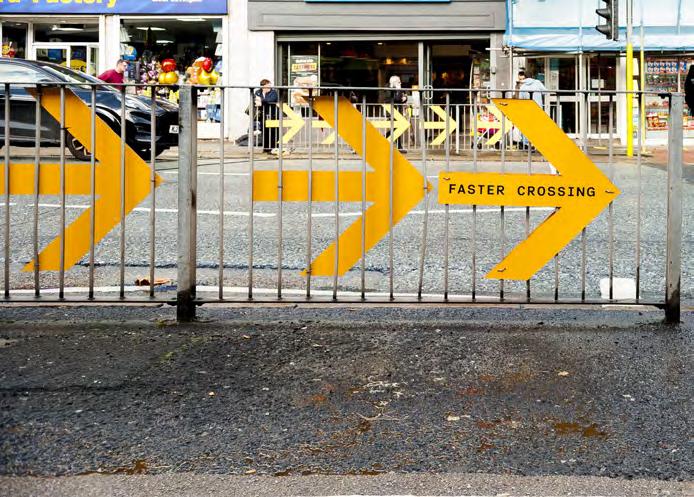
Plans for future periods
The Charity has an agreed strategy for the period 2021 – 2024. This has proven robust and relevant and driven grant and governance activity.
Plans are now in place to review our strategy in November 2024 to develop The RST strategy to 2027. Alongside delivery of the strategy the focus will be on developing our future grants programme and identifying key themes aligned to our stated objectives and vision. Building on our success during 2024, in relation to grant applicant support and advice, we will continue to seek to engage with new organisations and individuals who may wish to make an application.
Investments in the grants team to meet growth in the grants programme and the introduction of a new post, ‘Director of Communications’, will enable the Trust to develop a new communications strategy with a focus on dissemination and advocacy.
The introduction of a new ‘Governance and Compliance Officer’ will enable support for the Trust’s Governance responsibilities and help develop our approach to governance review, the audit programme and risk management.
During 2024-2025 we will plan a year’s programme to celebrate and disseminate the work of the Trust on what is our tenth year of operation. This will be supported by the development of an ‘Impact 2’ report on the outcome of grant projects. The appointment of new Trustees will add further support to Audit and Risk Committee, Road Safety Initiatives Committee and Communications.
The partnership that we have developed with PACTS as part of our ambition and strategic priority on dissemination and advocacy will be developed and supported by the experience and insights of the new Director of Communications.
The new CEO brings experience of UKROEd and NDORs and also extensive experience within the road safety sector and this will support our ambition to further develop out footprint and deepen existing relationships.
We have extended our presence at key road safety events and embraced membership of the ETSC (European Transport Safety Council) to extend our dissemination reach and to equally benefit from research and outcomes from across Europe.
A key priority for the Charity is to develop an informed approach to grant themes and commissioning. By extending our contribution and presence at forums, events and discussions we will become more informed by a wider and more diverse plethora of stakeholders.
This will also be enabled by our continuing collaboration with Stennik as consulting partner on communications and dissemination.
By increasing our profile, building on our progress during 2023, we will demonstrate value and invest in road safety through funded projects, commissioning of research and collaborations to increase advocacy. We have seen an increase in submission of high quality, practically focused and potentially impactful applications and wish to maintain this momentum.
The grant programme for Autumn 2024 will focus on ‘Inequalities in Road Safety’. Through this approach, we, The Road Safety Trust, will deliver our charitable purpose and vision.
The directors of UKROEd have commissioned a review of core system requirements and the development of new NDORS courses. This work has commenced, and we will ensure focus on identifying a focused, sequential and cost-effective process is in place. This will be supported by an agreed resource and capacity plan over the next 3 – 5 years and will in turn inform our approach to risk, data and system governance.
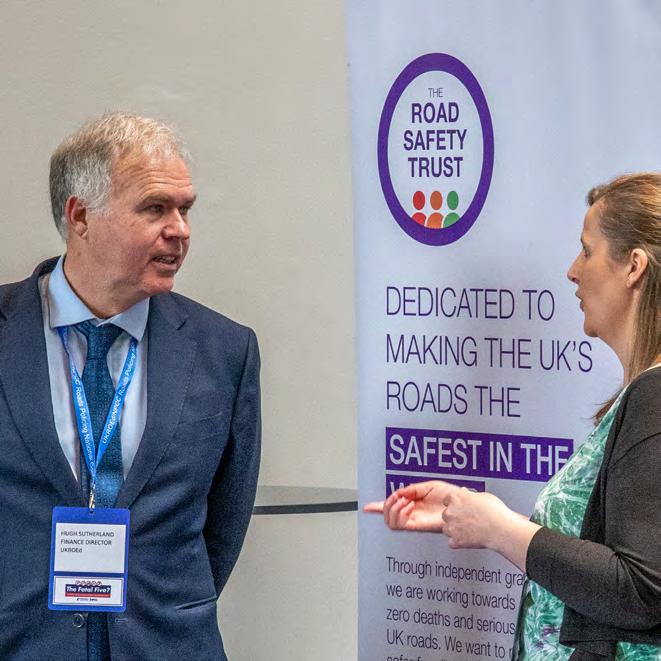
Principal risks and uncertainties
The Strategic Risk Register is reviewed three times a year by the Audit & Risk Committee and then reported to the Trust Board with a summary of the operational risks that are, or have become, significant. The Annual Board Risk Workshop in February 2024 continued to provide a firm base for assessing risks and the mitigations implemented. The potential impact of each of the strategic risks outlined below is considerable.
1. Financial sustainability
The Trust depends on its trading subsidiary as its sole source of income. While its subsidiary is legally obliged to distribute all of its surplus to the Trust, the amount of the surplus each year is variable and subject to risks which neither the Trust nor UKROEd can wholly control. The Trust holds reserves in respect of the risks associated with both the Trust and UKROEd and made a loan of £500,000 to UKROEd in April 2021 and extended the duration of the facility by one year in February 2024, which was outstanding at the year end. Care has been taken with the 3-year strategy and financial planning of the trading subsidiary to ensure its viability so that the Trust can continue its grant-making activity. A number of measures and monitoring tasks across governance and operations are in place to mitigate this risk.
2. Compliance
The Road Safety Trust or its trading subsidiary could inadvertently become non-compliant by not identifying, planning for or accommodating regulatory or legislative requirements, current or future. Work on Freedom of Information requests (including training for staff and Trustees) and General Data Protection Regulation (GDPR) took place during the year. Mitigating measures include: taking a collective responsibility for keeping abreast of existing and future legislative and future requirements and changes that might affect the Trust; taking relevant professional advice; using internal audits to identify gaps and improvement opportunities; maintaining up to date policies and procedures for staff and Trustees to follow; providing Trustees with oversight on audit and risk matters via the Audit & Risk Committee; managing staff effectively and carrying out staff training.
3. Purpose and impact
The risk is about projects funded by the Trust not achieving their objectives, or the way in which funds are awarded and managed by the Trust not being done properly. If either of these situations happen then the project objectives and their outcomes risk not being achieved, resulting in the
Charity not achieving its purpose and not being able to prove impact of its core activity (grant-making). Mitigating actions include close liaison with grantees to support and service their queries and concerns around their projects and facilitating adjustments that may be necessary so that we can remain informed and report on impact to the Trust, while aiming to complete projects on schedule as far as possible. Other mitigating actions include the online application software which serves to monitor and manage ongoing projects, internal audit checks, improved documentation/ guidance for applicants and regular staff supervision and training/support. To address the small staff team’s capacity of managing more than the optimum number of projects and grant application rounds, as well as other strategic priority initiatives, the Trust has in 2024 invested in increased resources and support.
4. Reputation
All of the above would have a reputational impact on the Trust, as would any significant events within UKROEd. In the event of a serious incident, the organisation as a whole has taken steps to ensure it is prepared to deal with and manage internal and external communications as a means of not making an already bad situation worse and to minimise the damage to its reputation.
5. Governance
In addition to governing the Charity, Trustees need to have oversight of the Charity’s trading subsidiary and be assured of its governance and management. Ineffective governance comprises a risk to the group. A clear governance structure, framework and relationship between the two companies and clear delegation of authorities and controls as well as effective performance reporting processes has been established. The recently approved legislation of the Police, Crime, Sentencing and Courts Act 2022 also presents new opportunities and risks for the group in terms of legal compliance alongside the scope for a wider set of activities and involvement in the road safety sector.
6. People and resources: Staff resilience
During 2023 a new risk was agreed by the Audit and Risk Committee and endorsed by the full Trustee Board. This risk captures the risk around resilience when delivering core operations with a small team and assesses that RST core operations will be affected by the loss, abstraction of key staff or a reduced capacity to deliver RST Delivery Plan.
RST have a small team (5) who all work less than full time. Total FullTime-Equivalent resource allocation (“FTE”) of the team is 4.3 FTE. Any
lengthy or unexpected abstraction of a key role will have significant impact on the ability of the RST to deliver on its core governance purpose and oversight of UKROEd, and the successful implementation, monitoring, and dissemination of the grant programmes.
Further, a key ambition of the Trust is to raise its profile amongst both the road safety landscape and amongst key stakeholders. A reduction in staff numbers or availability will have significant impact in this ambition.
This risk was highlighted recently as a key staff member was absent for a significant period. Increased workload may result in further staff losses through resignations and sickness. In order to mitigate this risk a succession plan has been developed.

Statement of internal financial control
The Board acknowledges its ultimate responsibility for ensuring that The Road Safety Trust has in place a system of internal financial control that is appropriate to the business environment in which it operates. Although no system of internal financial control can provide absolute reassurance against material misstatement or loss, the Trust’s system is designed to provide the Board with reasonable reassurance that:
• The financial information used within The Road Safety Trust or for publication is reliable
• Proper accounting records are maintained
• Assets are safeguarded against unauthorised use or disposition
• Problems are identified on a timely basis and dealt with appropriately
In addition, the Board is reassured by the following:
• Formal policies and procedures are in place, including the documentation of key systems and rules relating to the delegation of authorities, which allow the monitoring of controls and restrict the unauthorised use of the Trust’s assets. This includes strict controls for the authorisation of personal expense claims.
• Experienced and suitable staff take responsibility for important business functions.
• Forecasts and budgets are prepared which allow the Board and Senior Management Team (SMT) to monitor key business risks, financial objectives and progress towards financial plans set for the year through preparation of regular management accounts.
• All significant new initiatives and grant awards are subject to formal authorisation procedures, through the Board and its relevant committees.
• Regular reporting to the Board and sub-committees, including management accounts and detailed reports on the grant programmes.
• The Audit & Risk Committee reviews reports from management staff, the internal auditors and the external auditors, to provide reasonable assurance that control procedures are in place and are being followed.
• Formal procedures have been established for instituting appropriate action to correct weaknesses from the above reports.
Auditors
A resolution to re-appoint Crowe U.K. LLP will be put to the members at the forthcoming Annual General Meeting.
Statement as to disclosure of information to the auditor
The Trustees who were in office on the date of approval of these financial statements have confirmed, as far as they are aware, that there is no relevant audit information of which the auditor is unaware. Each of the Trustees has confirmed that they have taken all the steps that they ought to have taken as Trustees in order to make themselves aware of any relevant audit information and to establish that it has been communicated to the auditor.
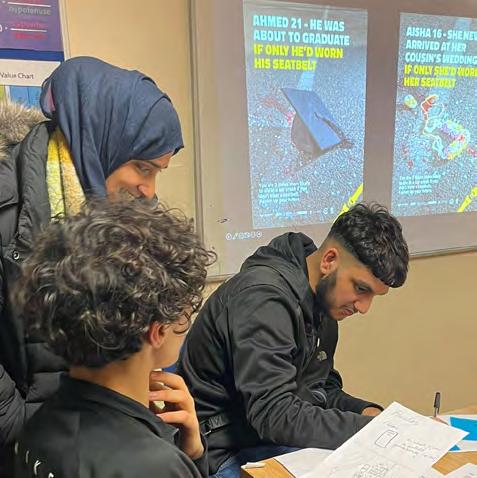
The Trustees’ Report, which contains the Directors’ Report required by company law, and the incorporated Strategic Report, were approved by the Trustees and are signed on their behalf by:

Tony Fuller, Chair 21st August 2024
Statement of Trustees’ Responsibilities
The Trustees (which comprises the directors for the purpose of company law) are responsible for preparing the Trustees’ Report (incorporating the Strategic Report) and the financial statements in accordance with applicable law and regulations.
Company and charity law requires the Trustees to prepare financial statements for each financial year. Under that law the Trustees have elected to prepare the financial statements in accordance with United Kingdom Generally Accepted Accounting Practice (United Kingdom Accounting Standards and applicable law).
Under company and charity law the Trustees must not approve the financial statements unless they are satisfied that they give a true and fair view of the state of affairs of the group and the charitable company and of the incoming resources and application of resources, including the income and expenditure, of the group and the charitable company for that period. In preparing those financial statements, the Trustees are required to:
• select suitable accounting policies and then apply them consistently;
• observe the methods and principles in the Charities Statement of Recommended Practice (SORP);
• make judgements and accounting estimates that are reasonable and prudent;
• state whether applicable UK accounting standards have been
followed, subject to any material departures disclosed and explained in the financial statements; and
• prepare the financial statements on the going concern basis unless it is inappropriate to presume that the group and the charitable company will continue in business.
The Trustees are responsible for keeping adequate accounting records that are sufficient to show and explain the group’s and the charitable company’s transactions and disclose with reasonable accuracy at any time the financial position of the group and the charitable company and enable them to ensure that the financial statements comply with the Companies Act 2006. They are also responsible for safeguarding the assets of the group and the charitable company and hence for taking reasonable steps for the prevention and detection of fraud and other irregularities.
The Trustees are responsible for the maintenance and integrity of the corporate and financial information included on The Road Safety Trust website.
Legislation in the United Kingdom governing the preparation and dissemination of financial statements may differ from legislation in other jurisdictions.
Independent Auditor’s Report to the members of The Road Safety Trust
Opinion
We have audited the financial statements of The Road Safety Trust (‘the charitable company’) and its subsidiaries (‘the group’) for the year ended 31 March 2024 which comprise the Consolidated Statement of Financial Activities, the Charity Statement of Financial Activities, the Consolidated and Charity Balance Sheets and the Consolidated Cashflow Statement and notes to the financial statements, including significant accounting policies. The financial reporting framework that has been applied in their preparation is applicable law and United Kingdom Accounting Standards, including Financial Reporting Standard 102 The Financial Reporting Standard applicable in the UK and Republic of Ireland (United Kingdom Generally Accepted Accounting Practice).
In our opinion the financial statements:
• give a true and fair view of the state of the group’s and of the parent charitable company’s affairs as at 31 March 2024 and of the group’s incoming resources and application of resources, including its income and expenditure for the year then ended;
• have been properly prepared in accordance with United Kingdom Generally Accepted Accounting Practice; and
• have been prepared in accordance with the requirements of the Companies Act 2006.
Basis for opinion
We conducted our audit in accordance with International Standards on Auditing (UK) (ISAs (UK)) and applicable law. Our responsibilities under those standards are further described in the Auditor’s responsibilities for the audit of the financial statements section of our report. We are independent of the charitable company and group in accordance with the ethical requirements that are relevant to our audit of the financial statements in the UK, including the FRC’s Ethical Standard, and we have fulfilled our other ethical responsibilities in accordance with these requirements. We believe that the audit evidence we have obtained is sufficient and appropriate to provide a basis for our opinion.
Conclusions relating to going concern
In auditing the financial statements, we have concluded that the Trustees’ use of the going concern basis of accounting in the preparation of the financial statements is appropriate. Based on the work we have performed, we have not identified any material uncertainties relating to events or conditions that, individually or collectively, may cast significant doubt on the Group’s or the parent charitable company’s ability to continue as a going concern for a period of at least twelve months from when the financial statements are authorised for issue. Our responsibilities and the responsibilities of the Trustees with respect to going concern are described in the relevant sections of this report.
Other information
The Trustees are responsible for the other information contained within the annual report. The other information comprises the information included in the annual report, other than the financial statements and our auditor’s report thereon. Our opinion on the financial statements does not cover the other information and, except to the extent otherwise explicitly stated in our report, we do not express any form of assurance conclusion thereon.
Our responsibility is to read the other information and, in doing so, consider whether the other information is materially inconsistent with the financial statements or our knowledge obtained in the audit or otherwise appears to be materially misstated. If we identify such material inconsistencies or apparent material misstatements, we are required to determine whether this gives rise to
a material misstatement in the financial statements themselves. If, based on the work we have performed, we conclude that there is a material misstatement of this other information, we are required to report that fact.
We have nothing to report in this regard.
Opinion on other matters prescribed by the Companies Act 2006
In our opinion, based on the work undertaken in the course of the audit:
• the information given in the Trustees’ report for the financial year for which the financial statements are prepared is consistent with the financial statements
• the information given in the Trustees’ report, which includes the Directors’ report and the strategic report prepared for the purposes of company law, for the financial year for which the financial statements are prepared is consistent with the financial statements; and.
• the strategic report and the Directors’ report included within the Trustees’ report have been prepared in accordance with applicable legal requirements.
Matters on which we are required to report by exception
In light of the knowledge and understanding of the group and charitable company and their environment obtained in the course of the audit, we have not identified material misstatements in the strategic report or the directors’ report included within the trustees’ report.
We have nothing to report in respect of the following matters in relation to which the Companies Act requires us to report to you if, in our opinion:
• adequate and proper accounting records have not been kept; or
• the financial statements are not in agreement with the accounting records and returns; or
• certain disclosures of trustees’ remuneration specified by law are not made; or
• we have not received all the information and explanations we require for our audit.
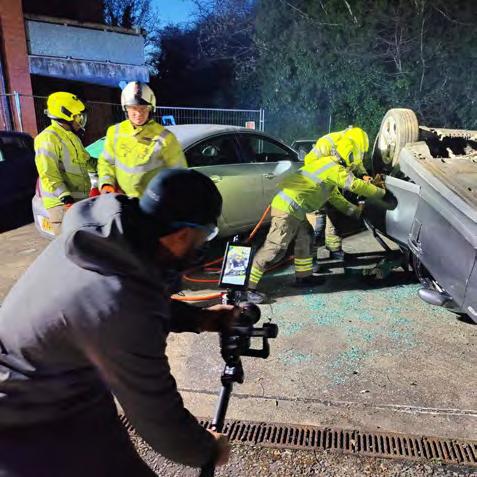
Responsibilities of trustees
As explained more fully in the trustees’ responsibilities statement set out on page 16, the trustees (who are also the directors of the charitable company for the purposes of company law) are responsible for the preparation of the financial statements and for being satisfied that they give a true and fair view, and for such internal control as the trustees determine is necessary to enable the preparation of financial statements that are free from material misstatement, whether due to fraud or error.
In preparing the financial statements, the trustees are responsible for assessing the charitable company’s ability to continue as a going concern, disclosing, as applicable, matters related to going concern and using the going concern basis of accounting unless the trustees either intend to liquidate the charitable company or to cease operations, or have no realistic alternative but to do so.
Auditor’s responsibilities for the audit of the financial statements
Our objectives are to obtain reasonable assurance about whether the financial statements as a whole are free from material misstatement, whether due to fraud or error, and to issue an auditor’s report that includes our opinion.
Reasonable assurance is a high level of assurance, but is not a guarantee that an audit conducted in accordance
with ISAs (UK) will always detect a material misstatement when it exists. Misstatements can arise from fraud or error and are considered material if, individually or in the aggregate, they could reasonably be expected to influence the economic decisions of users taken on the basis of these financial statements.
Details of the extent to which the audit was considered capable of detecting irregularities, including fraud and noncompliance with laws and regulations are set out below.
A further description of our responsibilities for the audit of the financial statements is located on the Financial Reporting Council’s website This description forms part of our Auditor’s report.
Extent to which the audit was considered capable of detecting irregularities, including fraud
Irregularities, including fraud, are instances of non-compliance with laws and regulations. We identified and assessed the risks of material misstatement of the financial statements from irregularities, whether due to fraud or error, and discussed these between our audit team members. We then designed and performed audit procedures responsive to those risks, including obtaining audit evidence sufficient and appropriate to provide a basis for our opinion.
We obtained an understanding of the legal and regulatory frameworks within which the charitable company and group operates, focusing on those laws and regulations that have a direct effect on the determination of material amounts and disclosures in the financial statements. The laws and regulations we considered in this context were the Companies Act 2006, the Charities Act 2011 together with the Charities SORP (FRS 102). We assessed the required compliance with these laws and regulations as part of our audit procedures on the related financial statement items.
In addition, we considered provisions of other laws and regulations that do not have a direct effect on the financial statements but compliance with which might be fundamental to the charitable company’s and the group’s ability to operate or to avoid a material penalty. We also considered the opportunities and incentives that may exist within the charitable company and the group for fraud. The laws and regulations we considered in this context for the UK operations were General Data Protection Regulation (GDPR) and taxation legislation.
Auditing standards limit the required audit procedures to identify noncompliance with these laws and regulations to enquiry of the Trustees and other management and inspection of regulatory and legal correspondence, if any.
We identified the greatest risk of material impact on the financial statements from irregularities,
including fraud, to be within the timing of recognition of income and the override of controls by management. Our audit procedures to respond to these risks included enquiries of management, internal audit and the Audit & Risk Committee about their own identification and assessment of the risks of irregularities, sample testing on the posting of journals, reviewing accounting estimates for biases, reviewing regulatory correspondence with the Charity Commission and reading minutes of meetings of those charged with governance.
Owing to the inherent limitations of an audit, there is an unavoidable risk that we may not have detected some material misstatements in the financial statements, even though we have properly planned and performed our audit in accordance with auditing standards. For example, the further removed non-compliance with laws and regulations (irregularities) is from the events and transactions reflected in the financial statements, the less likely the inherently limited procedures required by auditing standards would identify it. In addition, as with any audit, there remained a higher risk of nondetection of irregularities, as these may involve collusion, forgery, intentional omissions, misrepresentations, or the override of internal controls. We are not responsible for preventing noncompliance and cannot be expected to detect non-compliance with all laws and regulations.
Use of our report
This report is made solely to the charitable company’s members, as a body, in accordance with Chapter 3 of Part 16 of the Companies Act 2006. Our audit work has been undertaken so that we might state to the charitable company’s members those matters we are required to state to them in an auditor’s report and for no other purpose. To the fullest extent permitted by law, we do not accept or assume responsibility to anyone other than the charitable company and the charitable company’s members as a body, for our audit work, for this report, or for the opinions we have formed.

Vincent Marke Senior Statutory Auditor for and on behalf of Crowe U.K. LLP Statutory Auditor 55 Ludgate Hill London EC4M 7JW Date: 3rd September 2024
Consolidated Statement of Financial Activities
(Incorporating Income and Expenditure Account) for the year ended 31 March 2024
Consolidated Balance Sheet
Creditors: amounts falling due after more than one year
The Trustees acknowledge their responsibilities for complying with the requirements of the Act with respect to accounting records and preparation of financial statements.
The net income/(expenditure) in the charitable entity for 2024 was a deficit of £1,595,611 (2023 surplus: £47,990).
The financial statements were approved and authorised for signature by the Trustees and are signed on their behalf by:

Tony Fuller, Chair 21st August 2024
The notes on pages 52 to 63 form part of these Financial Statements
Charity Balance Sheet
Consolidated Statement of Cash Flows
The notes on pages 52 to 63 form part of these Financial Statements.

Notes to the Financial Statements
for the year ended 31 March 2022
1. General Information
The Road Safety Trust is a private limited company limited by guarantee, and is registered, domiciled and incorporated in England. The registered address is Colwyn Chambers, York Street, Manchester, M2 3BA.
2. Accounting policies
2.1 Basis of preparation of financial statements
The financial statements have been prepared in accordance with the Accounting and Reporting by Charities: Statement of Recommended Practice applicable to charities preparing their accounts in accordance with the Financial Reporting Standard applicable in the UK and Republic of Ireland (FRS 102) (second edition - October 2019) (effective 1 January 2019), FRS 102 and the Companies Act 2006.
The charitable company constitutes a public benefit entity as defined by FRS 102.
The accounts are prepared under the historical cost convention, modified to include certain financial instruments at fair value.
The financial statements are prepared in sterling, which is the functional currency of the charitable company. Monetary amounts in these financial statements are rounded to the nearest £1.
The financial statements consolidate the results of the charitable company and its wholly controlled subsidiary, UKROEd Limited, on a line-by-line basis. The Road Safety Trust is the sole member of UKROEd Limited and by virtue of this wholly controls UKROEd Limited. In accordance with section 408 of Companies Act 2006, no separate Statement of Financial Activities has been presented for The Road Safety Trust.
2.2 Going concern
At the time of approving the financial statements the Trustees have a reasonable expectation that the Charity and the group have adequate resources to continue in operational existence for the foreseeable future based on forecasts which have been stress tested in relation to the key uncertainties and assumptions. UKROEd has
overseen an increase in the capacity of the Scheme to service moderate growth in demand for courses, leading to strong and stable revenues for the company. The costs of administering the Scheme are well controlled, based on a fully articulated strategy, with flexible scheduling of developments alongside robust management of risk. The Trustees therefore have assurance that its primary income stream is sustainable and reliable. The Trust has managed its affairs to increase grant making activity to reduce the level of its substantial reserves to within the target range set out in its policy. The Trustees therefore continue to adopt the going concern basis of accounting in preparing the financial statements.
2.3 Income
Income from commercial trading activities consists of the income generated by the trading subsidiary UKROEd Limited. The income received for the management and operation of the National Driver Offender Retraining Scheme (NDORS), consisting of the collection of the Scheme Participation Charge, is recognised when the course occurs.
2.4 Investment income
Income from investments consists of interest earned on bank deposits and current accounts and distributions made by the subsidiary undertaking under gift aid and loans to the subsidiary undertaking. Income from fixed asset investments consists of dividend income. The Charity recognises all investment income on an accruals basis.
2.5 Expenditure
Liabilities are recognised as expenditure as soon as there is a legal or constructive obligation, it is probable that settlement will be required, and the amount of the obligation can be measured reliably.
All expenditure is accounted for on an accruals basis and allocated according to the nature of the expense.
Costs of charitable activities include grants made, governance costs and support costs as shown in note 5.
Costs of the commercial trading activities include the costs of the subsidiary’s operations and are shown in note 11. The element of the Scheme Participation Charge recovered by police forces is shown as cost of sales. The running costs of UKROEd Limited are shown as administrative expenses. The interest payable on the inter-company loan is shown as interest payable.
Expenditure on items of office equipment and computers whose cost is less than the threshold amount of £2,000 is charged as an expense. Items costing more than the threshold amount are capitalised as tangible fixed assets.
2.6 Grants
Grants payable are payments made to UK based organisations, registered charities and university departments in the furtherance of the charitable objectives of the charitable company. Grant commitments are recognised once an application for a grant has been approved, the recipient notified of the grant and a legal or constructive obligation thereby created. Single or multi-year grants are accounted for when either the recipient has a reasonable expectation that they will receive a grant and the Trustees have agreed to pay the grant without condition, or the recipient has a reasonable expectation that they will receive a grant and any condition attaching to the grant is outside the control of the charitable company.
2.7 Allocation of support and governance costs
Support costs are those functions that assist the work of the group but do not directly undertake charitable activities.
Governance costs are costs associated with the governance arrangements of the group. Included within this category are costs associated with the strategic as opposed to day to day management of the group’s activities.
2.8 Funds
Unrestricted funds are income receivable or generated for the objects of the group without further specified purpose.
2.9 Fixed asset investments
Investments are a basic financial instrument and are included in the balance sheet initially at transaction value and subsequently recognised at their fair value at the end of the financial period which is the bid price quoted on a recognised stock exchange. Realised and unrealised gains and losses are credited or debited to the Statement of Financial Activities in the year in which they arise.
2.10 Financial instruments
Financial instruments are classified and accounted for according to the substance of the contractual arrangement as financial assets or financial liabilities.
Basic financial assets, which include trade debtors, accrued income and amounts owed by group undertakings, are initially measured at the transaction price and are subsequently measured at amortised cost, being the transaction price less any amounts settled and any impairment losses.
Loans to the subsidiary undertaking are initially measured at transaction price and subsequently measured at amortised cost using the effective interest rate.
Basic financial liabilities, which include trade creditors, grants payable, other creditors and accruals, are initially measured at the transaction price and are subsequently measured at amortised cost, being the transaction price less any amounts settled.
2.11 Cash at bank and in hand
Cash at bank and cash in hand includes cash and short term highly liquid investments with a short maturity of three months or less from the date of acquisition or opening of the deposit or similar account.
2.12 Retirement benefits
For defined contribution schemes the amount charged to profit or loss are the contributions payable in the year. Differences between contributions payable in the year and contributions actually paid are shown as either accruals or prepayments.
3. Critical accounting estimates and areas of judgment
In the application of the charitable group’s accounting policies, the Trustees are required to make judgements, estimates and assumptions about the carrying amount of assets and liabilities that are not readily apparent from other sources. The estimates and associated assumptions are based on historical experience and other factors that are considered to be relevant. Actual results may differ from these estimates.
The estimates and underlying assumptions are reviewed on an ongoing basis. Revisions to accounting estimates are recognised in the period in which the estimate is revised.
In determining whether the subsidiary undertaking is acting as agent or principal with regard to an element of the ‘Scheme Participation Charge’ income, the Trustees have assessed whether it is the subsidiary undertaking or the relevant police force that has exposure to the significant risks and rewards associated with the provision of the NDORS scheme. The Trustees have determined that the subsidiary undertaking is acting as principal based on this assessment.
The element of the ‘Scheme Participation Charge’ income recovered by the police forces during the year was £86,830,353 (2023: £81,087,547).
Expenditure on charitable activities
6. Grants – Group and charity
6. Grants – Group and charity (cont’d)
*Grants paid from the Impact Fund represent a small number of additional grants paid for existing recipients to help enhance the impact of their projects.
**Grant commitments may be amended as the requirements of the project change, with the approval of the Road Safety Initiatives Committee.
Grants payable is the amount provided in respect of grants committed to recipients which had not yet been paid by the end of the year. The projects which are funded by the grants made are typically carried out over a period of more than one year and occasionally more than two years, with grant instalments payable in arrears when the projects reach agreed milestones. The amount of grants payable therefore reflects the grants committed in prior years, as well as the grants committed in the year.
Information about the nature of the projects being supported can be found in the Trustees’ Report.
7. Net income
8. Staff costs (cont’d)
During the year, 6 (2023: 6) Trustees were reimbursed expenses of £2,516 (2023: £2,494). This related to travel and other out of pocket expenses. No Trustees were paid during the year (2023: £Nil)
The key management personnel of the Group comprise the directors of UKROEd Limited and the Chief Executive Officer of the Charity. The total employment benefits of the key management personnel including National Insurance of the Group were £560,519 (2023: £500,419).
The key management personnel of the Charity comprise the Chief Executive Officer and the Head of Finance. The total employment benefits of the key management personnel of the Charity including National Insurance were £50,986 (2023: £75,270).
The number of employees whose total employee benefits exceeded £60,000 during the year for the charitable group was:
Net income is stated after charging: Fees payable to the auditors as follows:
8. Staff costs
9. Retirement benefit scheme
The Group operates a defined contribution pension scheme for all qualifying employees. The assets of the scheme are held separately from those of the group in an independently administered fund.
The employer’s pension costs charged to the Statement of Financial Activities during the year amounted to £105,487 (2023: £94,094).
10. Taxation
The Charity is exempt from tax on income and gains falling within section 505 of the Taxes Act 1988 or section 252 of the Taxation of Chargeable Gains Act 1992 to the extent that these are applied to its charitable objects.
11. Subsidiary undertaking
The Charity controls and is the sole member of UKROEd Limited, a company limited by. guarantee, incorporated in the United Kingdom (company number 08773977). Its registered office address is: Colwyn Chambers, York Street, Manchester, England, M2 3BA. A summary of the trading results are shown below:
12. Debtors
13. Creditors: Amounts falling due within one year
The income and expenditure of UKROEd Limited are shown under the heading ‘Other trading activities’ in the consolidated statement of income and expenditure account. The subsidiary made a distribution of £1,656,168 during the year to the charitable parent under gift aid (2023: £1,649,095).
14. Creditors: Amounts falling due after more than one year
15. Operating lease commitments
At 31 March 2024 the group and the Charity had commitments to make future minimum lease payments under non-cancellable operating leases as follows:
18. Reconciliation of net income to net cash flow from operating activities
Not later than 1 year
Later than 1 year and not later than 5 years
16. Limited liability
The company is limited by guarantee and does not have share capital. Each member gives a guarantee to contribute a sum, not exceeding £1, to the company should it be wound up. At 31 March 2024 there were 43 members (2023: 43).
17. Related party transactions
During the year £1,656,168 was distributed under gift aid from UKROEd Limited, the wholly owned subsidiary (2023: £1,649,095). A total of £nil was paid during the year, leaving a sum of £1,656,168 due at 31 March 2024 and is included in amounts owed by group undertakings (2023: £1,649,095).
The Charity recharged £nil of bank charges to UKROEd Limited (2023: £nil).
A loan of £500,000 was advanced to UKROEd in April 2021, repayable in October 2025, bearing interest annually at a rate of 6%. The balance on the loan to UKROEd Limited was £500,000 at 31 March 2024 (2023: £500,000).
Although not related parties as defined by FRS 102, in the interest of transparency the Trustees have the following other relationships;
• according to the Trust’s Articles of Association, the Police Force Trustee is the Chief Officer who is the National Lead for Roads Policing in England, Wales and Northern Ireland. The force which they lead will therefore be a recipient of income reflecting cost recovery arising from the NDORS Scheme payable by UKROEd Limited.
• the police forces overseen by the Police and Crime Commissioner appointed to the Board of Trustees will also be a recipient of income reflecting cost recovery arising from the NDORS Scheme payable by UKROEd Limited.
19. Control
At 31 March 2024 there was no one ultimate controlling party.
SAFETY THE TRUST ROAD
Making Roads Safer
